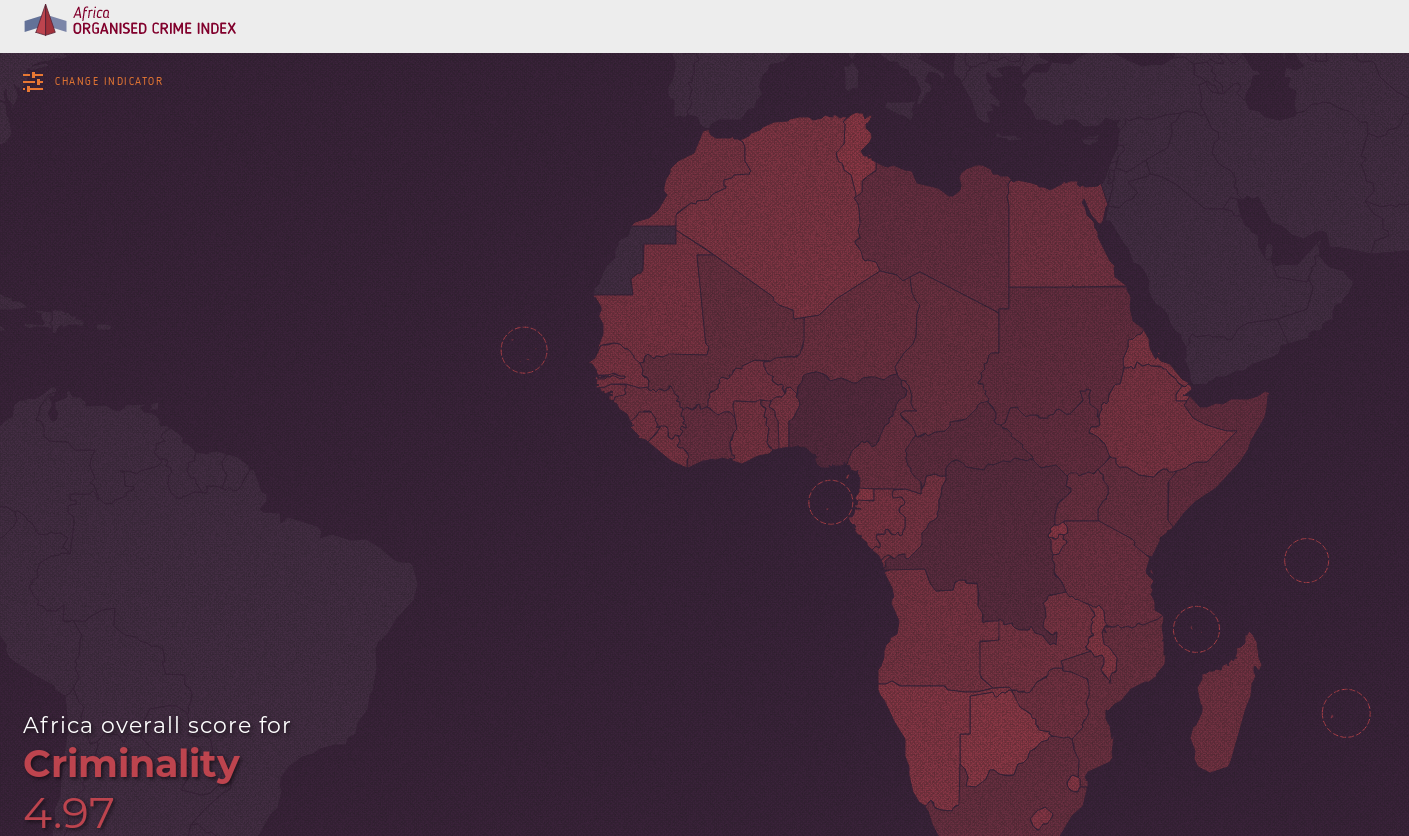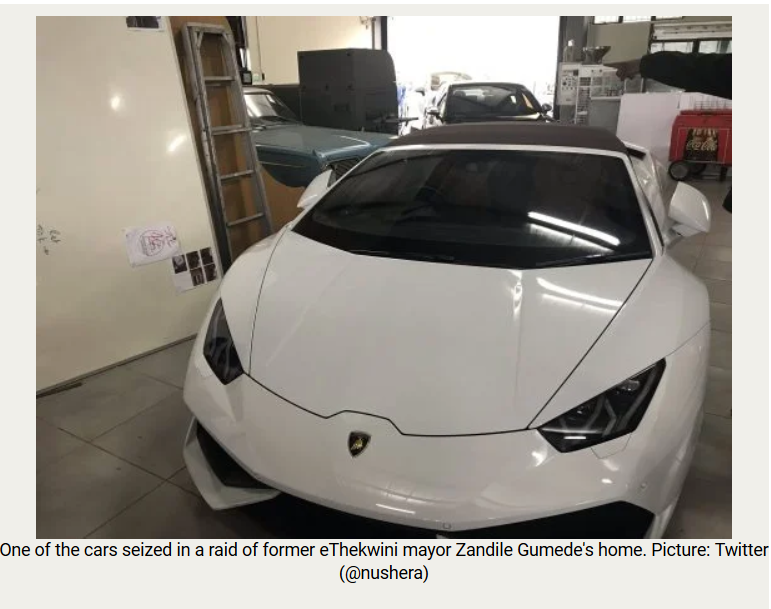How U.S. Firms Helped
Africa’s Richest Woman Exploit Her Country’s Wealth
By Michael Forsythe, Kyra Gurney,
Scilla Alecci and Ben
Hallman
·Published Jan. 19, 2020Updated Jan. 23, 2020

LISBON — [Update: Isabel
dos Santos is set to face embezzlement charges in Angola.]
It was the party to be seen at
during the Cannes Film Festival, where being seen was the whole point. A Swiss
jewellery company had rented out the opulent Hotel du Cap-Eden-Roc, drawing
celebrities like Leonardo DiCaprio, Naomi Campbell and Antonio Banderas. The
theme: “Love on the Rocks.”
Posing for photos at the May
2017 event was Isabel dos Santos, Africa’s richest woman and the daughter of José Eduardo dos
Santos, then Angola’s president. Her husband controls the jeweller, De
Grisogono, through a dizzying array of shell companies in Luxembourg, Malta and
the Netherlands.
But the lavish party was
possible only because of the Angolan government. The country is rich in oil and
diamonds but hobbled by corruption, with grinding poverty, widespread illiteracy
and a high
infant mortality rate. A state agency had sunk more than $120 million into
the jewellery company. Today, it faces a total loss.
Ms. dos Santos, estimated to be worth over $2 billion,
claims she is a self-made woman who never benefited from state funds. But a different picture has emerged under media scrutiny in recent
years: She took a cut of Angola’s wealth, often through decrees signed by her
father. She acquired stakes in the country’s diamond exports, its dominant
mobile phone company, two of its banks and its biggest cement maker, and
partnered with the state oil giant to buy into Portugal’s largest petroleum
company.
Now, a trove of more than 700,000 documents obtained by the
International Consortium of Investigative Journalists, and shared with The New
York Times, shows how a global network of consultants, lawyers, bankers and
accountants helped her amass that fortune and park it abroad. Some of the
world’s leading professional service firms — including the Boston Consulting
Group, McKinsey & Company and PwC — facilitated her efforts to profit from
her country’s wealth while lending their legitimacy.
The empire she and her husband built stretches from Hong
Kong to the United States, comprising over 400 companies and subsidiaries. It
encompasses properties around the world, including a $55 million mansion in
Monte Carlo, a $35 million yacht and a luxury residence in Dubai on a
seahorse-shaped artificial island.
Among the businesses was the Swiss jewellery company, which
records and interviews reveal was led by a team recruited from Boston
Consulting. They ran it into the ground. Under their watch, millions of dollars
in Angolan state funds helped finance the annual parties on the French Riviera.
When Boston Consulting and McKinsey signed on to help
restructure Sonangol, Angola’s state oil business, they agreed to be paid in an
unusual way — not by the government but through a Maltese company Ms. dos
Santos owned. Then her father put her in charge of Sonangol, and the government
payments soared, routed through another offshore company, this one owned by a
friend of hers.
PricewaterhouseCoopers, now called PwC, acted as her accountant,
consultant and tax adviser, working with at least 20 companies controlled by
her or her husband. Yet there were obvious red flags as Angolan state money
went unaccounted for, according to money-laundering experts and forensic
accountants who reviewed the newly obtained documents.
When the Western advisory firms came into Angola almost two
decades ago, they were viewed by the global financial community as a force for
good: bringing professionalism and higher standards to a former Portuguese
colony ravaged by years of civil war. But ultimately they took the money and
did what their clients asked, said Ricardo Soares de Oliveira, an international
politics professor at Oxford who studies Angola.
“They are there as all-purpose providers of whatever these
elites are trying to do,” he said. “They have no moral status — they are what
you make of them.”
Now, more than two years after her father stepped down
after 38 years as Angola’s strongman president, Ms. dos Santos is in trouble.
Last month, an Angolan court froze
her assets in the country as part of a corruption investigation, along with
her husband’s and those of a Portuguese business associate. The Angolan
attorney general claimed the couple were responsible for more than $1 billion
in lost state funds, with particular focus on De Grisogono and Sonangol.
Ms. dos Santos and her husband could face years in prison
if convicted, according to the office of Angola’s president, João Lourenço. At
the heart of the inquiry: $38 million in payments from Sonangol to a Dubai
shell company hours after Angola’s new president announced her firing. Ms. dos
Santos’s half brother is also facing corruption charges for helping to transfer
$500 million from Angola’s sovereign wealth fund. The asset freeze came soon
after I.C.I.J. reporting partners asked the government about transactions in
the documents.
In an interview with the BBC, Ms. dos Santos, 46, denied
any wrongdoing and called the inquiry a “political persecution.” “My companies
are funded privately, we work with commercial banks, our holdings are private
holdings,” she said.
Her husband, Sindika Dokolo, 47, suggested the new
government was scapegoating them. “It does not attack the agents of public
companies accused of embezzlement, just a family operating in the private
sector,” he told Radio France Internationale, another I.C.I.J. partner.
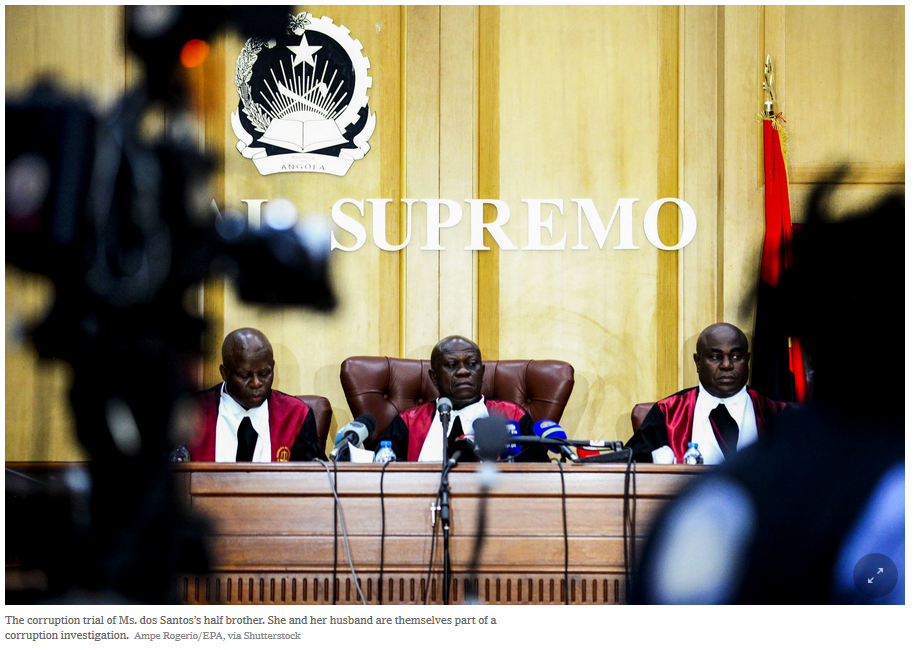
Global banks including Citigroup and Deutsche Bank, bound
by strict rules about politically connected clients, largely declined to work
with the family in recent years, the documents show.
“These guys hear about Isabel and they run like the Devil
from the cross,” Eduardo Sequeira, head of corporate finance for Fidequity, a
Portuguese firm that manages many of Ms. dos Santos’s companies, wrote in a
2014 email after the Spanish bank Santander turned down work with her.
Consulting companies, far less regulated than banks,
readily embraced her business. American advisory firms market their expertise
in bringing best practices to clients around the world. But in their quest for
fees, several have worked
for authoritarian or corrupt regimes in places like China or Saudi Arabia.
McKinsey’s business in South Africa was decimated
by its partnership with a subcontractor tied to a political scandal that took
down the country’s president.
The new leaks show the pattern repeating itself in Angola,
where invoices point to tens of millions of dollars going to the firms. They
agreed to be paid for Angolan government work by shell companies — tied to Ms.
dos Santos and her associates — that were in offshore locations long used to
avoid taxes, hide illicit wealth and launder money. The arrangement allowed her
to keep a large portion of the state funds, the records show.
(The documents, called the Luanda Leaks after the Angolan
capital, include emails, slide presentations, invoices and contracts. They came
to the I.C.I.J. through the
Platform to Protect Whistleblowers in Africa, a Paris-based advocacy and
legal group.)
PwC, based in London, said it was investigating its
dealings with Ms. dos Santos and would stop working with her family. Boston
Consulting said it took steps, when hired, “to ensure compliance with
established policies and avoid corruption and other risks.” McKinsey called the
allegations against Ms. dos Santos “concerning,” and said it wasn’t doing any
work now with her or her companies.
‘Shadow Management’
De Grisogono, an upstart Swiss jewellery company, was on
life support. Its business had never fully recovered from the global financial
crisis, and by 2012, it was deeply in debt.
Mr. Dokolo, Ms. dos Santos’s husband, seemed to offer a way
out. He teamed up with Sodiam, the Angolan state diamond marketer, in a 50-50
venture set up in Malta that took over the jeweller. The state enterprise
eventually pumped more than $120 million into the business, acquiring equity and
buying off debt, the records indicate. Documents show that shortly after the
acquisition, Mr. Dokolo put in $4 million, an amount he had gotten from a
“success fee” — drawn from the Sodiam money and shunted through a shell company
in the British Virgin Islands — for closing the deal.
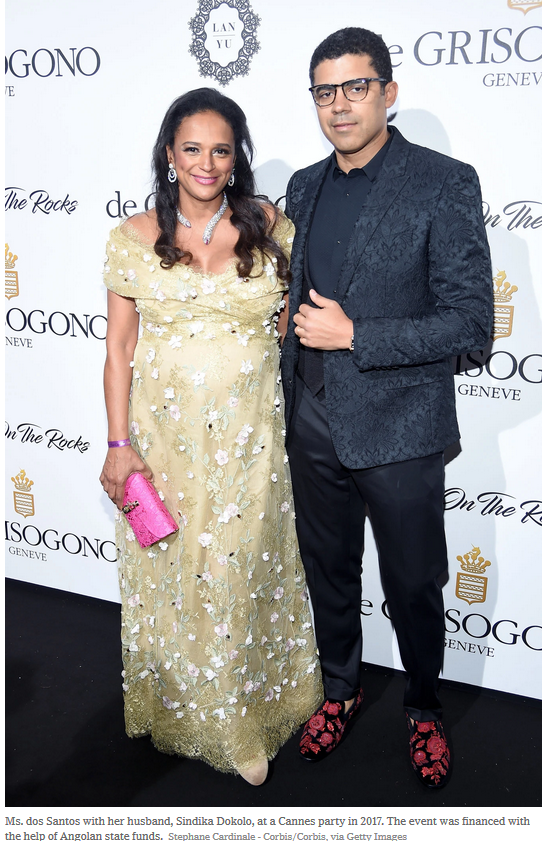
Mr. Dokolo, through his law firm, said he had initially
invested $115 million and “has subsequently invested significantly more into
the business,” but that could not be verified in the documents.
Flush with Angolan government money, the Geneva jeweller
hired the Boston Consulting Group, an American management company
with offices in more than 50 countries.
In 2012, according to the documents, a Lisbon-based team at
the firm took a central role in helping to run De Grisogono — “shadow
management” as John Leitão, a Boston Consulting employee who would become the jeweller’s
chief executive, said in a November interview in Lisbon.
The consulting firm, however, said its employees worked
only on three specific projects, ending its involvement in early 2013.
By that year, the consultants had started leaving the firm
to join the jeweller, eventually occupying the positions of chairman, chief
financial officer and chief operating officer alongside Mr. Leitão.
He said in the interview that the consultants had inherited
“a total mess.” But under his watch, the company, with boutiques in London, New
York and Paris, went deeper into the red, despite an initial uptick in sales,
documents show.
De Grisogono had a run of bad luck, including economic
pressures affecting Russian oligarchs and Saudi sheikhs who had been big
customers, Mr. Leitão said. Yet many rich patrons, including Ms. dos Santos and
her husband, would take jewellery and wristwatches without paying for them up
front, the documents show. Marketing expenses also shot up — 42 percent during
Mr. Leitão’s first year to $1.7 million, with the increase going to the Cannes
party, according to an internal presentation.
Mr. Dokolo was unapologetic about spending big on parties.
“You tell me what major luxury brand spends less than this on promotion to
become a global brand,” he told the French radio service. In an interview with
BBC, Ms. dos Santos said she was not a stakeholder in De Grisogono, though
several emails and documents call that into question, indicating she had an
ownership interest in the Maltese companies controlling it.
The jeweller gave the couple an ability to better market
Angolan diamonds. Mr. Dokolo already controlled the rights to more than 45
percent of the country’s diamond sales through a company that bought uncut
gems, generating hundreds of millions of dollars in income, according to the
Angolan president’s office.
Mr. Dokolo’s lawyers said he aimed to integrate the
country’s diamond industry, “from mining to polishing to retail sales.”
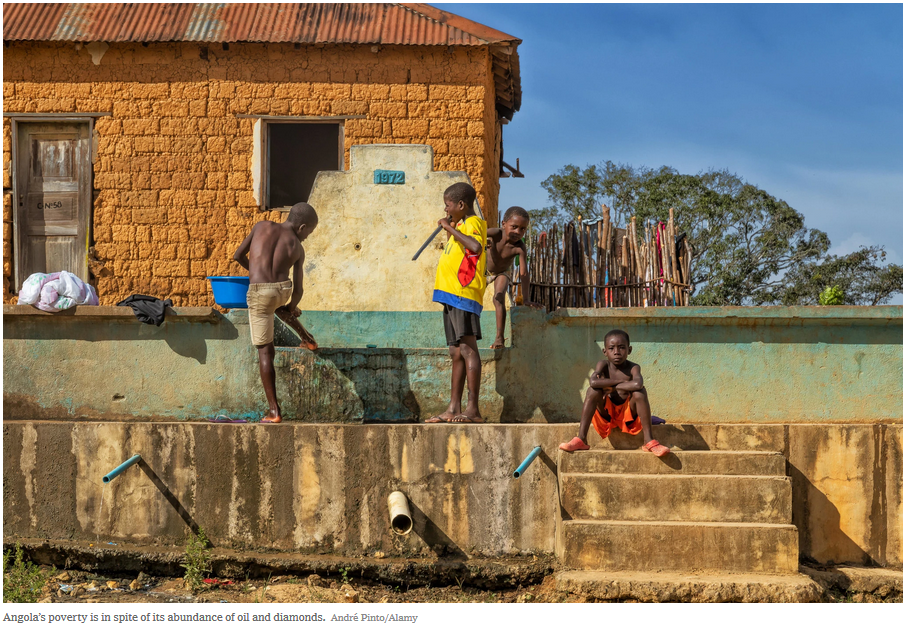
The Angolan people did more than pay dearly for a European jewellery
company. They paid with money borrowed at a 9 percent annual interest rate from
Banco BIC, an Angolan lender where Ms. dos Santos owns
a 42.5 percent stake. The government will have to repay some $225 million,
according to the Angolan president’s office. The loans had been guaranteed by
Ms. dos Santos’s father.
For all the money it put in, Sodiam never exercised any
management control of the jeweller and never recouped any of its investment.
Now, Sodiam officials want out, and the business is for sale.
“It is strange,” said Eugenio Bravo da Rosa, Sodiam’s new
chairman, speaking of the man he replaced, who had signed off on the
investment. “I can’t believe a person would start a business and let its
partner run the business with total power to make all the decisions.”
Striking Oil
In 2016, Sonangol, Angola’s state oil company, was in
crisis after a drop in market prices. One former Boston Consulting employee
described a company in an “absolutely chaotic” state. The Angolan president
fired the company’s board and appointed his daughter, Ms. dos Santos, as
chairwoman that June. Boston Consulting was helping Sonangol come up with a
“road map” to restructure.
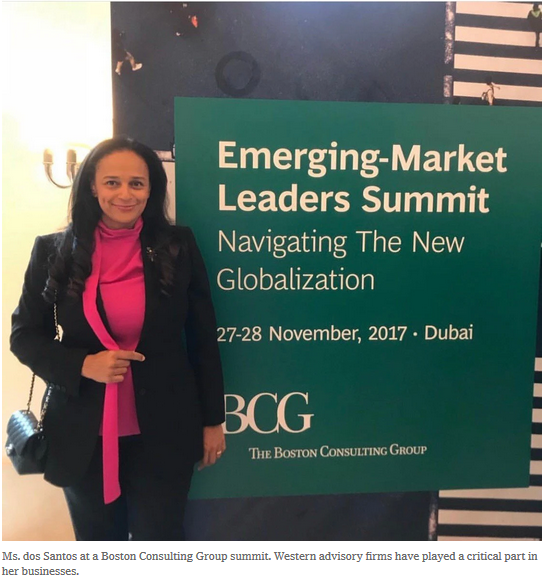
Ms. dos Santos had a history with the company. A decade
earlier, she and her husband made millions partnering with Sonangol and a
Portuguese businessman to invest in a Lisbon gas company, Galp Energia. Their
stake came courtesy of the Angolan government — through an $84 million loan
from Sonangol, documents show. Their share in Galp is now worth about $800
million.
The former Boston Consulting employee, speaking on the
condition of anonymity, said that Ms. dos Santos — the president’s eldest child
— was able to get things done that other executives could not because she
wasn’t susceptible to pressure.
“We’re very committed to transparency,” Ms. dos Santos told
Reuters at the time. “We’re very committed to improving our profits at Sonangol
and to improving our organization.”
But transparency went only so far. More than half a year
before she was named chairwoman, her father signed off on a decree drafted at
the couple’s law firm, records show, that led to the awarding of $9.3 million
to a Maltese company to oversee Sonangol’s restructuring. The business, Wise
Intelligence Solutions, was owned by the couple and run by a close associate,
Mário Leite da Silva, De Grisogono’s former chairman. Boston Consulting came on
board, followed by McKinsey, with the Maltese firm acting as their manager.
Boston Consulting and other advisers billed for only about
half of what Wise received from the Angolan treasury, receipts and invoices
show, even though the Maltese company had only limited expertise of its own.
Wise “does not have the human resources and specific know-how,” its Maltese
accountant said in a March 2016 email. Ms. dos Santos disputed this, with her
law firm saying Wise had “technical expertise.”
After she took charge of Sonangol, the payments to the
offshore companies would surge even higher.
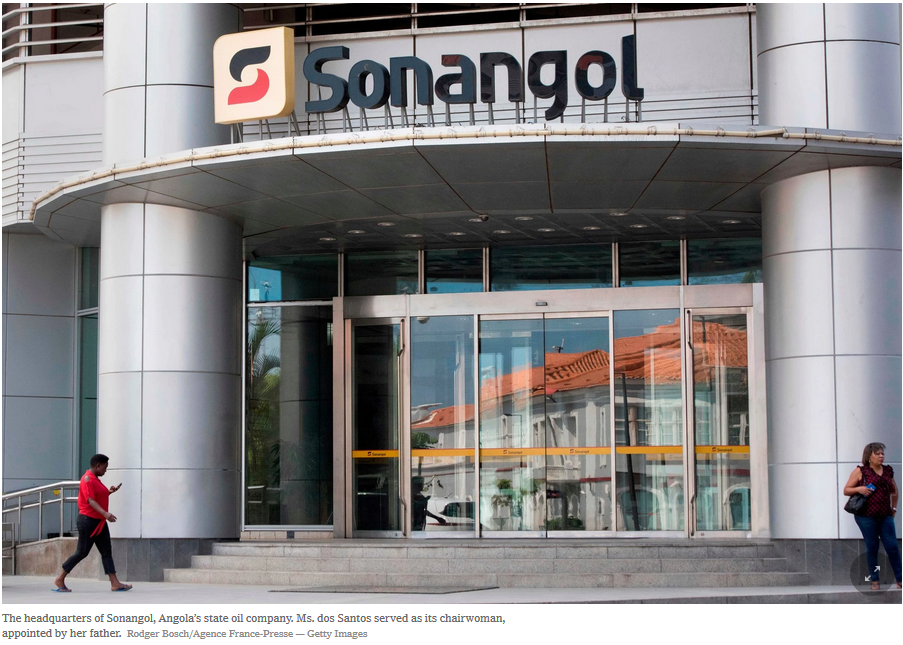
In May 2017, Wise was replaced as project manager by a
company in Dubai owned by one of her friends. It issued a flurry of invoices
later that year, some with the barest of details. One of them, simply marked
“Expenses May-September 2017,” carried a charge of more than 470,000 euros
(over $520,000). These invoices account for the $38 million Sonangol paid to
the Dubai company in the hours after Ms. dos Santos was fired on Nov. 15, 2017.
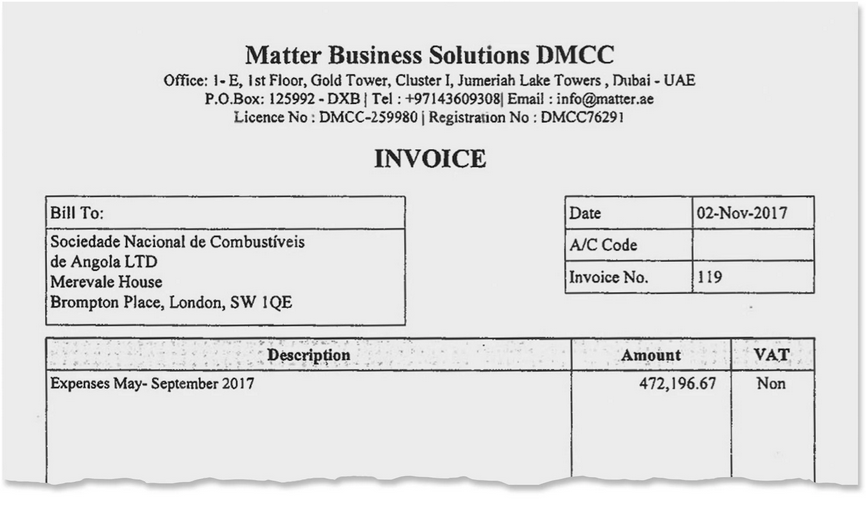
The Sonangol account was with the Portuguese arm of Banco
BIC, where she was the biggest shareholder. Shunned by global banks, the couple
increasingly relied on the Angolan lender, which has a big office in Lisbon
steps from her apartment. In 2015, Portuguese regulators said the bank had
failed to monitor money flowing from Angola to European companies linked to her
and her associates, concluding that the lender lacked internal controls.
“Paying huge and dubious consulting fees to anonymous
companies in secrecy jurisdictions is a standard trick that should sound all
alarm bells,” said Christoph Trautvetter, a forensic accountant based in Berlin
who worked as an investigator for KPMG, a global business advisory firm.
Days before the invoices were issued, the Sonangol
executive who would have approved them was fired, replaced by a relative of Ms.
dos Santos, the documents show. The managing director of the Dubai company,
Matter Business Solutions DMCC, was her frequent associate Mr. da Silva.
Months later, Carlos Saturnino, Ms. dos Santos’s successor
as Sonangol’s head, publicly accused her of mismanagement, saying her tenure
was marked by conflicts of interest, tax avoidance and excessive reliance on
consultants. He also said she had approved $135 million in consulting fees,
with most of that going to the Dubai shell company.
“We have there some situations of money laundering, some of
them of doing business with herself,” Hélder Pitta Grós, Angola’s attorney
general, said in an interview with I.C.I.J. partners.
Ms. dos Santos, speaking with the BBC, said the Dubai
company supervised work for Sonangol by Boston Consulting, McKinsey, PwC and
several other Western firms. When asked about the invoices, she said she was
unfamiliar with them but insisted the expenses were legitimate, charged at “the
standard rate” under a contract approved by Sonangol’s board.
“This work was extraordinarily important,” she added,
saying that Sonangol cut its costs by 40 percent.
Her lawyers said the $38 million was “for services that had
already been provided and delivered by consultants in accordance with the
contract.”
By late 2017, Boston Consulting was winding down its work
on the project, which ended that November. McKinsey and PwC declined to
comment.
The consultants’ involvement with Ms. dos Santos extended
far beyond the Swiss jeweller and Sonangol. McKinsey, for example, provided
advice on a Portuguese engineering firm she had just acquired and the Angolan
mobile phone company where she served as chairwoman, documents show.
Two of the “big four” accounting firms, PwC and KPMG, did
consulting work for Urbinveste, another thinly staffed company she owned that
acted as a public works contractor in Angola. It oversaw projects — such as
road and port design and urban redevelopment — worth hundreds of millions of
dollars, some set to be financed with loans from Chinese banks and built by
Chinese state-owned companies. KPMG also audited at least two companies she
owned in the country. The firm said that in Angola, it performs “additional due
diligence procedures” for all the businesses it audits.
The other two major accounting firms, Deloitte and Ernst
& Young, now known as EY, did work for companies tied to her as well.
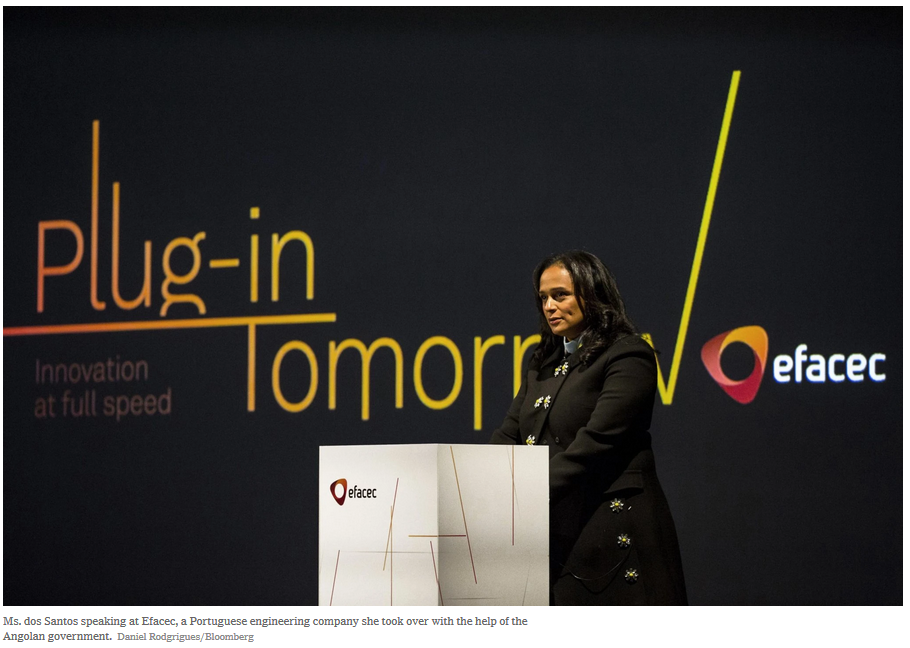
Accounting firms in the European Union, where much of Ms.
dos Santos’s business empire was located, are bound by the same rules banks
are, requiring them to report suspicious activity. One firm in particular, PwC,
had a broad view into the inner workings of Ms. dos Santos’s empire.
The Accountant
Ms. dos Santos had a long history with PwC. In the early
1990s, fresh out of King’s College London, she took a job with Coopers & Lybrand, soon to merge to
become PricewaterhouseCoopers.
Her top money manager, Mr. da Silva, whose assets in Angola
were frozen last month, was also a PwC alum. And when Ms. dos Santos took over
Sonangol, she brought in a PwC partner, Sarju Raikundalia, as its finance head.
The payments to Dubai in November 2017 happened on his watch before he, too,
was fired. Neither of the businessmen responded to requests for comment.
PwC not only audited the books of her far-flung shell
companies, but also provided her and Mr. Dokolo’s companies with tax advice and
did consulting work for Sonangol.
Like Boston Consulting, PwC was paid by Wise Intelligence
for its Angola work, and it audited the financial statements of the Maltese
holding companies that controlled the Swiss jeweller.
In 2014, PwC accountants in Malta had a problem. As they
prepared annual financial statements for Victoria Limited, one of the Maltese
companies that controlled De Grisogono, they wrote in a draft that the ultimate
owners were Mr. Dokolo and the Angolan government. But Antonio Rodrigues, an
executive at Fidequity, objected — the couple had been facing increasing media
scrutiny after a 2013 Forbes article examined the origins of their wealth. Such
information, he wrote, should not “be mentioned.”
“Noted — we will discuss internally and revert,” a PwC
accountant replied. The language was removed.
PwC accountants also noticed there was no paperwork to
account for millions of dollars in loans being pumped into the Maltese holding
companies and De Grisogono, according to emails.
Robert Mazur, who was an anti-money-laundering investigator
for the United States Customs Service, reviewed the PwC financial statements at
the I.C.I.J.’s request, along with email exchanges between the accountants and
Ms. dos Santos’s money managers.
“The accountants and financial service providers involved
in these transactions should have seriously considered filing a suspicious
transaction report,” he said.
When presented with the I.C.I.J.’s findings, PwC said it
would not comment on specific projects, citing client confidentiality, but said
it was ending its work with Ms. dos Santos. “In response to the very serious
and concerning allegations that have been raised,” the firm said, “we
immediately initiated an investigation and are working to thoroughly evaluate
the facts and conclude our inquiry.”
As for Ms. dos Santos’s assets, the bulk of her fortune is
now outside Angola, much of it in tax and secrecy havens where it will be hard
to pry loose.
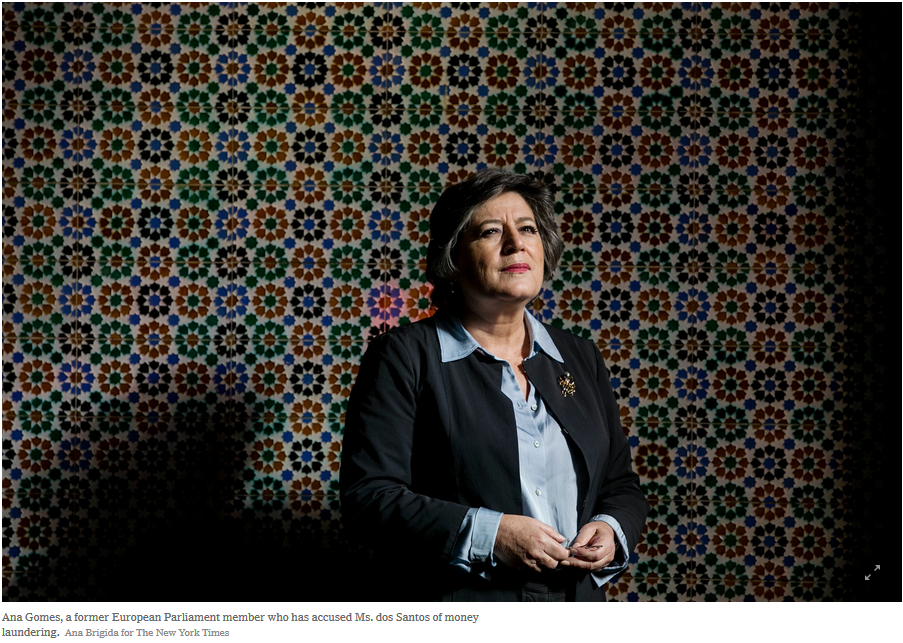
Ana
Gomes, a former European Parliament member, filed a complaint in November in
Portugal alleging that Ms. dos Santos laundered money through Banco BIC. Ms.
Gomes said that the network of professional service firms had enabled Ms. dos
Santos to move her money out of Angola and into legitimate businesses in Europe
and elsewhere.
“They are
part of a system of finding the safest landing for all the assets that are
siphoned off,” she said.
KYRA
GURNEY, SCILLA ALECCI and BEN HALLMAN are reporters for the International
Consortium of Investigative Journalists, based in Washington.
A version
of this article appears in print on Jan. 20, 2020, Section A, Page 1 of the New
York edition with the headline: Earning Riches By Exploiting A Poor Nation. Order Reprints | Today’s Paper | Subscribe
Read More://
https://www.nytimes.com/2020/01/19/world/africa/isabel-dos-santos-angola.html










 PRETORIA, 6 February 2020 – A three-day
high-level combating transnational organised crime and enhancing asset
forfeiture conference jointly organised by the UN Office of Drugs and Crime in
Southern Africa and the African Prosecutors Association, in co-operation with UK
Department For International Development and United States, International Narcotics
Law Programmes was concluded in Pretoria. This workshop was part of a bigger initiative
that included the deployment of mentors, national and regional workshops and
the development of training manuals. Together, all of these initiatives are
aimed to help to achieve the 2030 Agenda
advancing the targets and indicators of SDG 1, SDG 8, SDG12, SDG14 and 15. This
workshop also addressed SDG 16 and 16.4 that deals with Illicit Financial
Flows.
PRETORIA, 6 February 2020 – A three-day
high-level combating transnational organised crime and enhancing asset
forfeiture conference jointly organised by the UN Office of Drugs and Crime in
Southern Africa and the African Prosecutors Association, in co-operation with UK
Department For International Development and United States, International Narcotics
Law Programmes was concluded in Pretoria. This workshop was part of a bigger initiative
that included the deployment of mentors, national and regional workshops and
the development of training manuals. Together, all of these initiatives are
aimed to help to achieve the 2030 Agenda
advancing the targets and indicators of SDG 1, SDG 8, SDG12, SDG14 and 15. This
workshop also addressed SDG 16 and 16.4 that deals with Illicit Financial
Flows.

